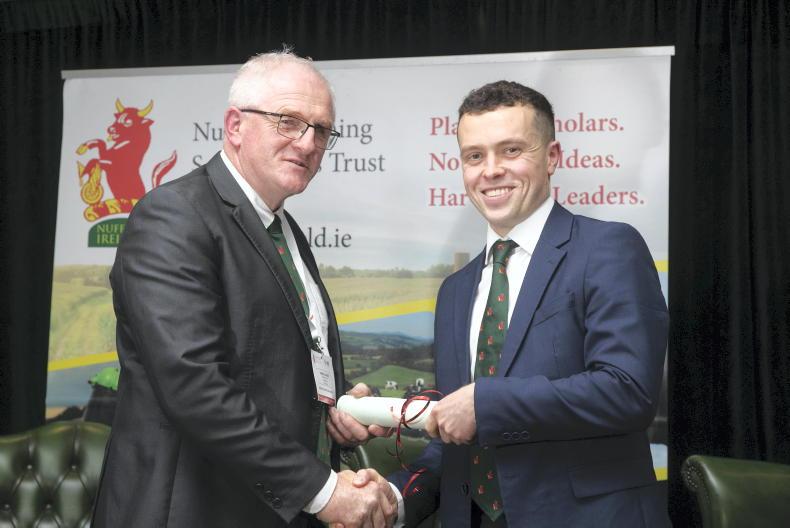Our pasture-based system exists within our unique symbiosis of climate, land and water. Growing and utilising grass underpins the competitiveness, profitability and sustainability of Ireland’s dairy production system. We need to achieve good or high ecological status in all water bodies whose quality and biological health are currently impacted by increased concentrations of nutrients, such as phosphorus and nitrogen.
Our pasture-based system exists within our unique symbiosis of climate, land and water. Growing and utilising grass underpins the competitiveness, profitability and sustainability of Ireland’s dairy production system.
We need to achieve good or high ecological status in all water bodies whose quality and biological health are currently impacted by increased concentrations of nutrients, such as phosphorus and nitrogen.
Nitrogen is an important nutrient excreted by livestock and required for maximising grass production, and agriculture and the natural nitrogen cycle are intrinsically linked.
Being awarded a Nuffield Scholarship has been an honour and a unique opportunity as a farmer to travel and carry out research into this challenge.
My aim has been to investigate grassland management practices which can deliver resilience in our farming systems, mitigating nitrogen loss to water while maintaining the productivity of grass-based dairy farms.
This study sets out to look at the challenge from a root cause perspective.
The recent pressure on the renewal of the nitrates derogation may be our short-term motivation, but the focus on water quality will continue to be central to our success in the long term.
Causes
There are many causes for the pressure exerted on water quality from grazing dairy production.
Water movement, and soil nitrate concentration at the time of water movement, cause nitrate loss to water.
The forecast impacts of climate change disrupting weather patterns and events in Ireland will make improving water quality more difficult.
Landscape features and nitrate-vulnerable zones on free-draining soils, the timing of nutrient management, and farm fragmentation can all have a strong influence on the causes of nitrate loss to water.
The Agricultural Catchments Programme (ACP) was put in place to inform the Irish Nitrates Action Programme. This research continues to show a very weak correlation between whole farm stocking rate and the nitrogen load in rivers.
There is little evidence from the ACP to suggest that the cessation of the nitrates derogation would reduce nitrates concentration in Irish waters.
However, farm expansion using fragmented land parcels as support may increase the N losses in the form of nitrate from the whole farm, especially when the milking platform is becoming more highly stocked.
While artificial fertiliser and slurry take much of the blame, 66% of nitrogen lost from our grazing system is derived from the animals’ urine.

David Fennelly at the Nuffield conference with Joe Leonard.
My core research objectives were to unearth these root causes of the pressure on water quality from grazing dairy systems and identify farm practices and further research to mitigate this challenge. I have arrived at the following recommendations:
Data shows that 80% of nitrate loss takes place from autumn to early spring. Farmers need a traffic light advisory system for nutrient application events. This proposed collaborative system must engage relevant stakeholders including Met Éireann, PastureBase Ireland and the Environmental Protection Agency (EPA). This could be delivered with support from dairy co-operatives in their catchment areas, for increased accuracy and a means to offer advice to otherwise hard-to-reach farmers. Slurry storage must be increased across Irish farms as a matter of urgency. Where slurry storage capacity is insufficient relative to the optimal timing of applications, there is an increased risk to water quality. Increased funding will soon be available for same – it must be a streamlined process with current, realistic reference costs. Farmers must be encouraged to engage in continued professional development training in the area of soil management and the nitrogen cycle. Observational skills are required to assess and monitor soil function and a strong scientific knowledge is required to understand the nitrogen cycle. In order to limit the nitrogen loss on farms, nitrogen surplus must become a new key performance indicator (KPI) for discussion groups. This is a positive setting in which the top performers can help improve the performance of other farmers. Plantain should be included in grassland mixes to increase its proportion in the diet of grazing ruminants. While persistency remains a challenge, very few tools are as effective in lowering the nitrate loss from urine deposition by 30%. A heightened level of agronomy in pasture-based farming is necessary. This service could make more efficient use of nutrient resources, troubleshoot production issues, offering a sound source of mentoring to help farmers in difficult growing seasons — key to maintaining the uptake of technology. More over-simplistic legislation alone will not solve this very nuanced issue. It will take widespread practice change at farm level. We also need some recognition from the EPA and EU legislators, that agriculture can’t carry the full cost of increasingly disruptive weather patterns that may lead to nutrient loss to the environment.
David Fennelly is a 2023 Nuffield Scholar and dairy farmer from Emo, Co Laois. David presented his findings to the Nuffield Ireland 2024 conference in November, with a focus on reducing the impact on water quality from pasture-based dairy farming systems.





SHARING OPTIONS: